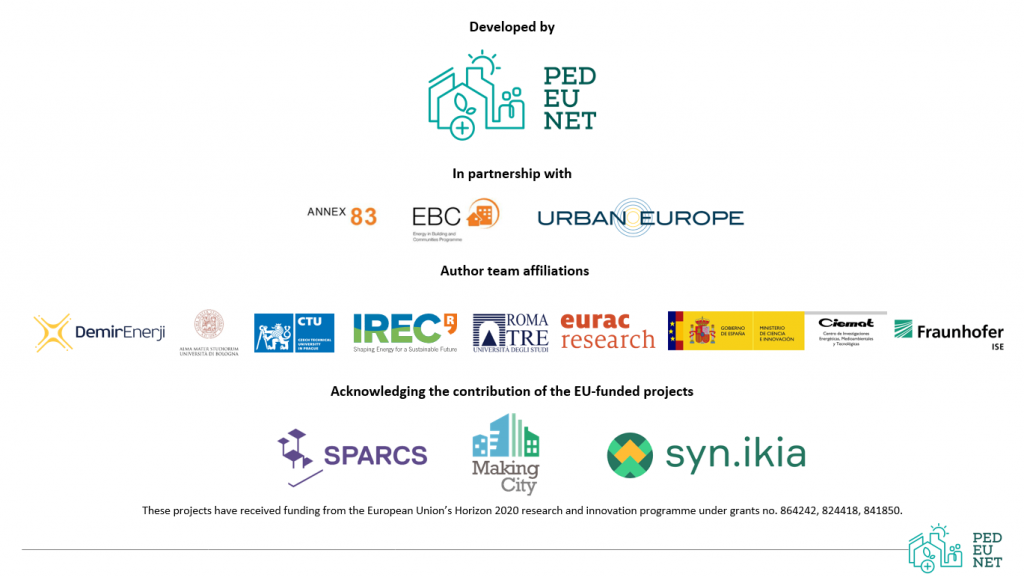| D1P001: Name of the project | |
| D1P001: Name of the project | DigiTwins4PEDs |
| D1P002: Project assigned code | |
| D1P002: Project assigned code | F-DUT-2022-0210 |
| D1P003: Start date | |
| D1P003: Start date | 10/23 |
| D1P004: End date | |
| D1P004: End date | 03/26 |
| D1P005: Ongoing project | |
| D1P005: Ongoing project | Yes |
| D1P006: Funding programme/financing model | |
| FP7/H2020/HEU/DUT | no |
| Interreg | no |
| National funding | yes |
| National funding | DUT Partnership |
| Public-Private Partnership - please specify | no |
| Other | no |
| D1P007: Estimated project costs (Mill. €) | |
| D1P007: Estimated project costs (Mill. €) | 1.56 |
| D1P008: Description of project objectives/concepts | |
| D1P008: Description of project objectives/concepts | So far, there are hardly any examples that investigate the community-driven urban energy transformation towards Positive Energy Districts (PEDs). Despite different urban energy simulation tools available to help in planning and management of PEDs, the community-wide adaptability of PEDs is still a major concern. This ultimately hinders the progress in realising PEDs and proves to be a major bottleneck to achieve the ambitious EU goal of 100 PEDs deployment by 2025. To close this gap, DigiTwins4PEDs project will use innovative research methods and implementation strategies supported by a participatory process involving key stakeholders and citizens within the stages of co-design, co-creation and co-learning which will be developed, evaluated and iteratively adapted. Through the framework of living labs supported by different case studies, citizens will be continuously engaged throughout the project so that citizen-driven actions can be considered and implemented more easily in the future to enable active consumer participation for a flexible energy management and interaction between PEDs and the regional energy system. To support this public participation process, new tools and methods using Urban Digital Twins will be developed and adapted, allowing citizens to push forward the energy transition of their communities and take more informed decisions. |
| D1P009: Description of project upscaling strategies/potential | |
| D1P009: Description of project upscaling strategies/potential | |
| D1P010: Number of PED case studies in the project | |
| D1P010: Number of PED case studies in the project | |
| D1P011: Case Study | |
| D1P011: Case Study | |
| D1P012: Description of project expected impact | |
| D1P012: Description of project expected impact | |
| D1P013: Standardization efforts | |
| D1P013: Standardization efforts | |
| D1P014: Sources | |
| D1P014: Sources | |
| D1P015: Can you specify a suitable contact person regarding the load-management approach within your PED project? | |
| Name | Prof. Dr. Volker Coors |
| volker.coors@hft-stuttgart.de | |
| D1P016: Would you be willing to share data from your PED project for research purposes? | |
| D1P016: Would you be willing to share data from your PED project for research purposes? | Yes |

Authors (framework concept)
Beril Alpagut (Demir Energy); Giulia Turci (University of Bologna); Michal Kuzmic (Czech Technical University in Prague); Paolo Civiero (Università Roma Tre); Serena Pagliulia (University of Bologna); Oscar Seco (CIEMAT); Silvia Soutullo (CIEMAT); Daniele Vettorato (EURAC Research, IEA Annex 83); Bailador Ferreras M. Almudena (CIEMAT); Vicky Albert-Seifried (FHG ISE)
Contributors (to the content)
Laura Aelenei (LNEG), Nienke Maas (TNO), Savis Gohari (OsloMet), Andras Reith (ABUD), Ghazal Etminan (AIT), Maria-Beatrice Andreucci (Universita Sapienza), Francesco Reda (VTT, IEA Annex 83), Mari Hukkalainen (VTT), Judith-Borsboom (Locality), Gilda Massa (ENEA), Jelena Ziemele (University of Latvia), Nikola Pokorny (CVUT), Sergio Diaz de Garayo Balsategui (CENER, IEA Annex 83), Matthias Haase (ZHAW, IEA Annex 83), Christoph Gollner (FFG, JPI UE), Silvia Bossi (ENEA, JPI UE), Christian Winzer (Zurich University of Applied Science), George Martinopoulos (Centre for Research and Technology Hellas), Maria Nuria Sánchez (CIEMAT), Angelina Tomova (Energy Agency of Plovdiv), Oya Tabanoglu (Demir Enerji), Jelena Brajković (University of Belgrade), Juveria Shah (Dalarna University), Michela Pirro (ENEA), Francesca Sabatini (University of Bologna)
Implemented by
Boutik.pt: Filipe Martins, Jamal Khan
Marek Suchánek (Czech Technical University in Prague)